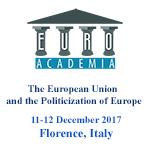Euroacademia Conferences
 Europe Inside-Out: Europe and Europeanness Exposed to Plural Observers (9th Edition) April 24 - 25, 2020
Europe Inside-Out: Europe and Europeanness Exposed to Plural Observers (9th Edition) April 24 - 25, 2020 Identities and Identifications: Politicized Uses of Collective Identities (9th Edition) June 12 - 13, 2020
Identities and Identifications: Politicized Uses of Collective Identities (9th Edition) June 12 - 13, 2020 8th Forum of Critical Studies: Asking Big Questions Again January 24 - 25, 2020
8th Forum of Critical Studies: Asking Big Questions Again January 24 - 25, 2020 Re-Inventing Eastern Europe (7th Edition) December 13 - 14, 2019
Re-Inventing Eastern Europe (7th Edition) December 13 - 14, 2019 The European Union and the Politicization of Europe (8th Edition) October 25 - 26, 2019
The European Union and the Politicization of Europe (8th Edition) October 25 - 26, 2019 Identities and Identifications: Politicized Uses of Collective Identities (8th Edition) June 28 - 29, 2019
Identities and Identifications: Politicized Uses of Collective Identities (8th Edition) June 28 - 29, 2019 The European Union and the Politicization of Europe (7th Edition) January 25 - 26, 2019
The European Union and the Politicization of Europe (7th Edition) January 25 - 26, 2019 7th Forum of Critical Studies: Asking Big Questions Again November 23 - 24, 2018
7th Forum of Critical Studies: Asking Big Questions Again November 23 - 24, 2018 Europe Inside-Out: Europe and Europeanness Exposed to Plural Observers (8th Edition) September 28 - 30, 2018
Europe Inside-Out: Europe and Europeanness Exposed to Plural Observers (8th Edition) September 28 - 30, 2018 Identities and Identifications: Politicized Uses of Collective Identities (7th Edition) June 14 - 15, 2018
Identities and Identifications: Politicized Uses of Collective Identities (7th Edition) June 14 - 15, 2018
The Vigils of Lights: The Question of Europe’s Universalism and its Philosophical Timelessness as Undecidability of the Human Subject; Jacques Derrida’s Messianism and the Crisis of European Identity as the Debt of Capital and the Time of Liberal Democracy
-
-

-
Presentation speakers
- Jack Robert Coopey, Durham University, UK
Abstract:
Europe is in crisis. This crisis rears a many-faced head, possessing one of political, social and economic nuances. The notion of crisis represents not as a dilemma of absence of choice, but the very presupposed need of a choice. This choice is supported by the conditions of liberal democracy, which presumably are the Spirit of Europe through tradition of equality of human beings and democracy. This spirit is placed in the belief of the autonomy of the European subjectivity to selfgovern and participate in the wider democratic conditions, values and meanings which surround its existence. Since every subjectivity will eventually reach its death, it possesses a temporal existence, every individual must be permitted to live as well embrace its inevitable end. In this vein, subjectivity is temporality. However if the liberal-democratic system is in crisis of identity, not only does the subjectivity in which the system is based is made invalid, but the very spirit of Europe is also deflated as result. In essence, the subject of Europe is dead, its house or system being liberal democracy is broken, and therefore the spirit of Europe needs to change or it will collapse further in the dusts of its dismay. If the spirit of Europe and its European values is to continue burning its flames, and not turn into ash and cinders, a new ‘European subject’ is needed in order to prevent a new nihilism since the advent of the Nietzschean death of God and Heidegger’s apocalyptic pronouncement of ‘only the gods can save us’. What is the philosophical consequence of Deconstruction on the European Enlightenment project of Universalism? The latter set of questions are, what can Derrida’s ‘messianism without messianism’ on his philosophy of time and the democracy to come do to solve this crisis?
-
Related Presentations

Do Bail-out and Bail-in Events Fuel Cyclicity of Financial Crisis: Empirical Assessment Using Hordrick Prescott Filter from 1993 to 2012
- Amira Kaddour
- Jihene Jbenieni

Brexit and the Democratization of the EU Regime
- Pierre Haroche













